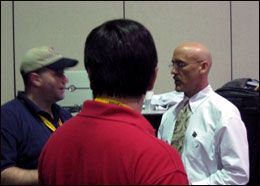By Maveric Vu
EMS1 Staff
 Photo by Maveric Vu Author/cartoonist Steve Berry, right, speaks with providers after his lecture at EMS Today. |
One day, paramedic Steve Berry received a phone call from a coworker who vaguely asked him about arrangements.
Berry was confused.
“Arrangements for what?” he asked.
“Wait, you don’t know?” the man on the line said. “Kim’s dead.”
Berry’s partner of 15 years had died two days earlier. This was the first he had heard of the news.
“My peers didn’t even call me to tell me that my partner was dead,” Berry said to a teary-eyed audience. “And I felt betrayed.”
Berry — a popular author, cartoonist, and speaker — recalled the events that stemmed from that 2005 day during a lecture about death and grieving at EMS Today Friday in Baltimore.
According to Berry, medical providers are more likely to be in denial of death than employees in any other profession. Medical providers are “in the job of saving lives” and are uncomfortable with giving up control, he said.
His department’s mishandling of the situation reflects a larger attitude of death avoidance ingrained in the EMS profession, Berry said.
“Our culture has pretty good traditions to honor the deceased,” Berry said. “But after the bagpipes plays, it stops.”
As acknowledgment of Kim’s death continued to be “non-existent” within his department, Berry struggled through his own journey of grief and denial, something he described as like “getting hit by lightning.”
However, part of the healing process is to eventually move past denial by openly discussing your emotions and actually talking about the person who died, he said.
Inspired by his partner, Berry took his emotional energy and reinvested it into the National EMS Memorial Bike Ride, a long-distance trek in May in honor of deceased providers.
Berry said the deficiencies of dealing with a department death stems from a larger crisis within the EMS profession.
“It’s always about ‘me and my partner’ or ‘me and my truck,’” Berry said after the lecture. “We are so fractured and can’t see the big picture.”
While Berry said that he has not seen drastic improvements within departments, he is hopeful that attitudes and protocols will change in the future.
During the lecture, Berry emphasized the things EMS providers could do to better cope with death within their department.
For managers, Berry suggested assigning an “overseer,” someone with an intimate connection with the survivors who could provide emotional support. He also recommended that managers assign multiple, rotating partners, so that the individual would not feel like their partner was being replaced.
For crewmates, Berry emphasized open and deliberate displays of support: sending a card, asking questions, and making comfort food for each other.
And for those similar to himself, who have lost a partner or someone close to them, Berry upheld a simple concept – it is OK to grieve.
At one point during his speech, Berry showed a picture of a Marine who stood guard overnight for a woman who wished to keep vigil next to the casket of her husband who died in the line of duty.
“Why don’t we have that for us?” Berry said. “It’s high time that EMS honors and respects our own fallen.”











